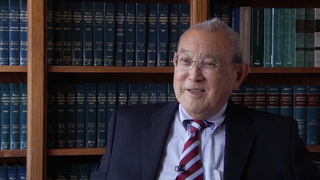Interviews
Working on the 'case of a lifetime'
I started working on this case when I was one or two years fresh out of law school. Many people would call this the case of a lifetime, and to have that quote, “case of a lifetime” as soon as you get out of law school is really pretty amazing. It taught me so many things that have served me on a regular basis. It certainly taught me about how politics relates to the law, and how inextricably linked political decisions are from legal decisions. It gave me a perspective on the law that I think I bring to my work constantly, that there's a relationship between law, politics, economics, social structures, prejudice. The law embodies everything that exists in society. It is not a separate entity, and that again, the law is an elastic entity to the extent that it can and should be used as a tool to effectuate social change. Certainly the case gave me that perspective. In other words, kind of a critical view of the law rather than just an accepting view of the law.
Date: March 23 & 24, 2000
Location: Washington, US
Interviewer: Margaret Chon, Alice Ito
Contributed by: Denshō: The Japanese American Legacy Project.



